do的口语用法归纳
- 格式:doc
- 大小:29.50 KB
- 文档页数:2
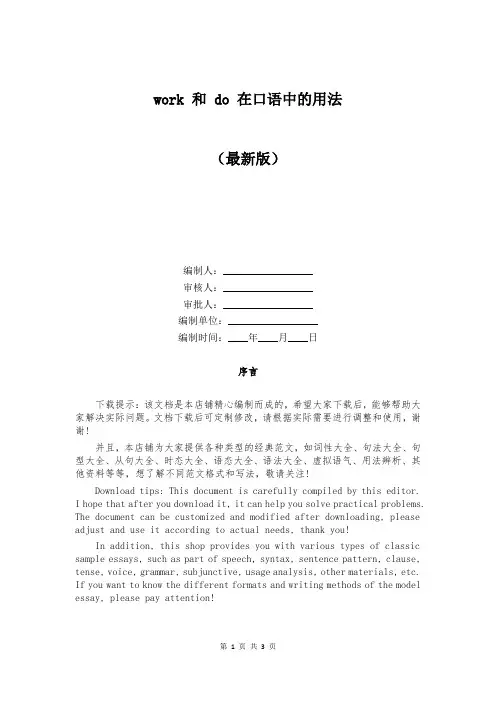
work 和 do 在口语中的用法(最新版)编制人:__________________审核人:__________________审批人:__________________编制单位:__________________编制时间:____年____月____日序言下载提示:该文档是本店铺精心编制而成的,希望大家下载后,能够帮助大家解决实际问题。
文档下载后可定制修改,请根据实际需要进行调整和使用,谢谢!并且,本店铺为大家提供各种类型的经典范文,如词性大全、句法大全、句型大全、从句大全、时态大全、语态大全、语法大全、虚拟语气、用法辨析、其他资料等等,想了解不同范文格式和写法,敬请关注!Download tips: This document is carefully compiled by this editor.I hope that after you download it, it can help you solve practical problems. The document can be customized and modified after downloading, please adjust and use it according to actual needs, thank you!In addition, this shop provides you with various types of classic sample essays, such as part of speech, syntax, sentence pattern, clause, tense, voice, grammar, subjunctive, usage analysis, other materials, etc. If you want to know the different formats and writing methods of the model essay, please pay attention!work 和 do 在口语中的用法请看下面的这道题:—How do you feel after taking the medicine?—Oh, it __________. I'm feeling much better now.A. costsB. losesC. doesD. works分析:此题应选D。
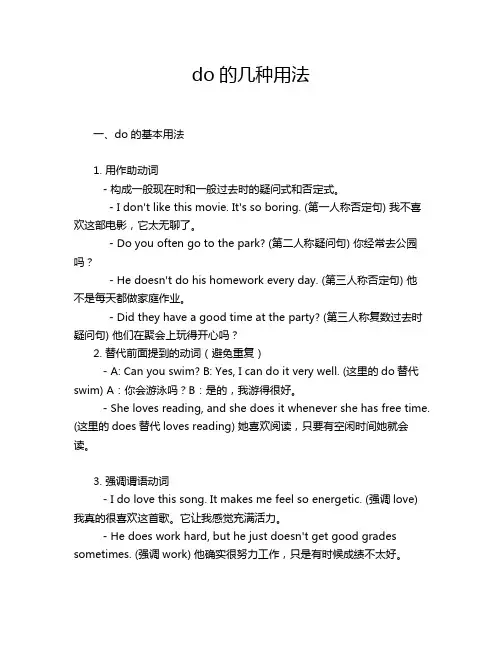
do的几种用法一、do的基本用法1. 用作助动词- 构成一般现在时和一般过去时的疑问式和否定式。
- I don't like this movie. It's so boring. (第一人称否定句) 我不喜欢这部电影,它太无聊了。
- Do you often go to the park? (第二人称疑问句) 你经常去公园吗?- He doesn't do his homework every day. (第三人称否定句) 他不是每天都做家庭作业。
- Did they have a good time at the party? (第三人称复数过去时疑问句) 他们在聚会上玩得开心吗?2. 替代前面提到的动词(避免重复)- A: Can you swim? B: Yes, I can do it very well. (这里的do替代swim) A:你会游泳吗?B:是的,我游得很好。
- She loves reading, and she does it whenever she has free time. (这里的does替代loves reading) 她喜欢阅读,只要有空闲时间她就会读。
3. 强调谓语动词- I do love this song. It makes me feel so energetic. (强调love) 我真的很喜欢这首歌。
它让我感觉充满活力。
- He does work hard, but he just doesn't get good grades sometimes. (强调work) 他确实很努力工作,只是有时候成绩不太好。
二、do的固定搭配1. do with- What are you going to do with this old book? You can't just leave it here. (第二人称疑问句) 你打算怎么处理这本旧书?你不能就把它扔这儿。
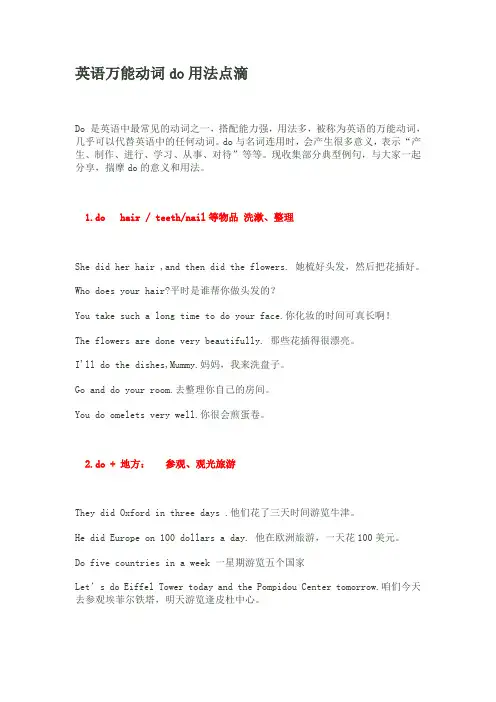
英语万能动词do用法点滴Do 是英语中最常见的动词之一,搭配能力强,用法多,被称为英语的万能动词,几乎可以代替英语中的任何动词。
do与名词连用时,会产生很多意义,表示“产生、制作、进行、学习、从事、对待”等等。
现收集部分典型例句,与大家一起分享,揣摩do的意义和用法。
1.do hair / teeth/nail等物品洗漱、整理She did her hair ,and then did the flowers. 她梳好头发,然后把花插好。
Who does your hair?平时是谁帮你做头发的?You take such a long time to do your face.你化妆的时间可真长啊!The flowers are done very beautifully. 那些花插得很漂亮。
I'll do the dishes,Mummy.妈妈,我来洗盘子。
Go and do your room.去整理你自己的房间。
You do omelets very well.你很会煎蛋卷。
2.do + 地方:参观、观光旅游They did Oxford in three days .他们花了三天时间游览牛津。
He did Europe on 100 dollars a day. 他在欧洲旅游,一天花100美元。
Do five countries in a week 一星期游览五个国家Let’s do Eiffel Tower today and the Pompidou Center tomorrow.咱们今天去参观埃菲尔铁塔,明天游览逢皮杜中心。
3.do + 由动词变来的动名词(Ving)He does cooking and she does washing.他来做饭,她负责洗衣服。
It’s teaching that he does. 他的工作是教书。
4.do + 人物、戏剧:演出(戏剧等)、扮演(人物)、模仿He did the main character in the play. 他在剧中饰演主角。
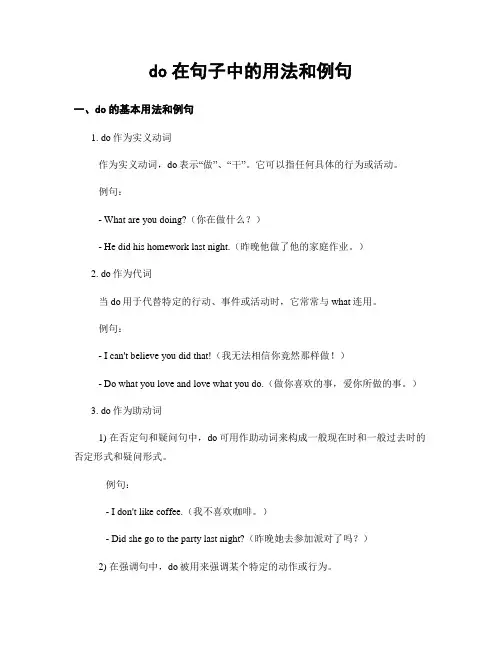
do在句子中的用法和例句一、do的基本用法和例句1. do作为实义动词作为实义动词,do表示“做”、“干”。
它可以指任何具体的行为或活动。
例句:- What are you doing?(你在做什么?)- He did his homework last night.(昨晚他做了他的家庭作业。
)2. do作为代词当do用于代替特定的行动、事件或活动时,它常常与what连用。
例句:- I can't believe you did that!(我无法相信你竟然那样做!)- Do what you love and love what you do.(做你喜欢的事,爱你所做的事。
)3. do作为助动词1) 在否定句和疑问句中,do可用作助动词来构成一般现在时和一般过去时的否定形式和疑问形式。
例句:- I don't like coffee.(我不喜欢咖啡。
)- Did she go to the party last night?(昨晚她去参加派对了吗?)2) 在强调句中,do被用来强调某个特定的动作或行为。
例句:- I DO like burgers!(我确实喜欢汉堡!)- She DID study really hard for the exam.(她的确为考试努力学习了。
)4. do做“整顿”、“处理”的意思在口语中,do可以表示“整顿”、“处理”或“解决”。
例句:- Let's do the dishes after dinner.(吃完晚饭我们洗碗吧。
)- I need to do my hair before we go out.(我们出门前我要理一下头发。
)二、do的常用搭配和表达方式1. do with + 名词表示应对某种情况或处置某事。
例句:- We have a lot of leftover food. What should we do with it?(我们有很多剩菜,该怎么处理?)- I don't know what to do with all these clothes.(不知道如何处理这些衣服。
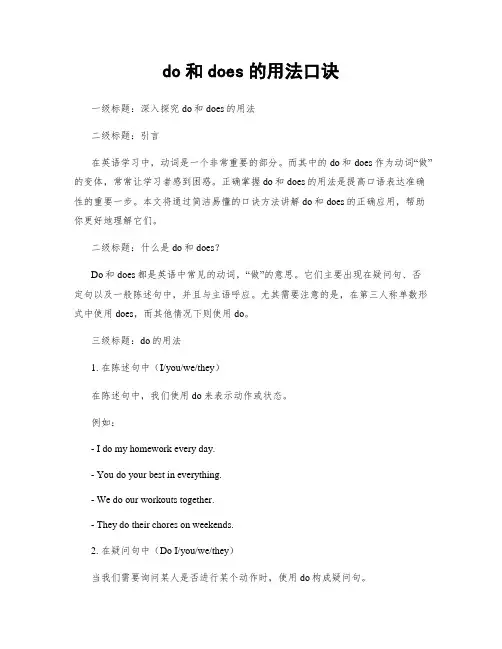
do和does的用法口诀一级标题:深入探究do和does的用法二级标题:引言在英语学习中,动词是一个非常重要的部分。
而其中的do和does作为动词“做”的变体,常常让学习者感到困惑。
正确掌握do和does的用法是提高口语表达准确性的重要一步。
本文将通过简洁易懂的口诀方法讲解do和does的正确应用,帮助你更好地理解它们。
二级标题:什么是do和does?Do和does都是英语中常见的动词,“做”的意思。
它们主要出现在疑问句、否定句以及一般陈述句中,并且与主语呼应。
尤其需要注意的是,在第三人称单数形式中使用does,而其他情况下则使用do。
三级标题:do的用法1. 在陈述句中(I/you/we/they)在陈述句中,我们使用do来表示动作或状态。
例如:- I do my homework every day.- You do your best in everything.- We do our workouts together.- They do their chores on weekends.2. 在疑问句中(Do I/you/we/they)当我们需要询问某人是否进行某个动作时,使用do构成疑问句。
例如:- Do I need to bring my own utensils?- Do you like cats?- Do we have a meeting this afternoon?- Do they want to join us for dinner?3. 在否定句中(I/you/we/they + don't)在表达否定意思时,使用don't加上动词原形。
例如:- I don't understand this math problem.- You don't need to worry about it.- We don't agree with your decision.- They don't know the answer.二级标题:does的用法1. 在陈述句中(third-person singular)既然do用于一般形式,那么does则出现在第三人称单数主语的陈述句中。
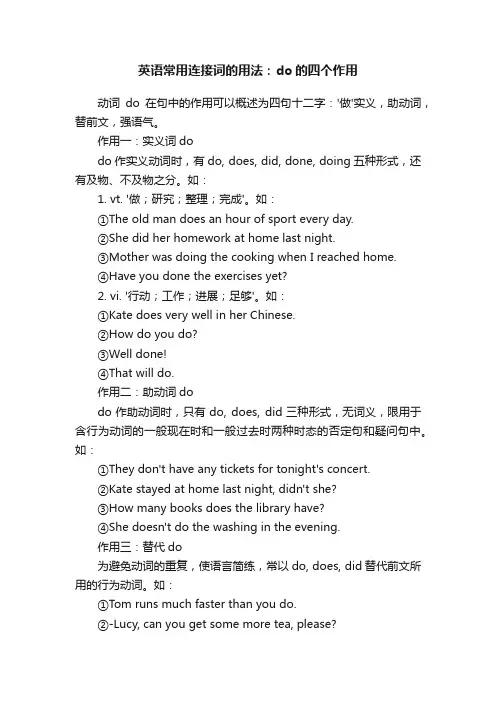
英语常用连接词的用法:do的四个作用动词do在句中的作用可以概述为四句十二字:'做'实义,助动词,替前文,强语气。
作用一:实义词dodo作实义动词时,有do, does, did, done, doing五种形式,还有及物、不及物之分。
如:1. vt. '做;研究;整理;完成'。
如:①The old man does an hour of sport every day.②She did her homework at home last night.③Mother was doing the cooking when I reached home.④Have you done the exercises yet?2. vi. '行动;工作;进展;足够'。
如:①Kate does very well in her Chinese.②How do you do?③Well done!④That will do.作用二:助动词dodo作助动词时,只有do, does, did三种形式,无词义,限用于含行为动词的一般现在时和一般过去时两种时态的否定句和疑问句中。
如:①They don't have any tickets for tonight's concert.②Kate stayed at home last night, didn't she?③How many books does the library have?④She doesn't do the washing in the evening.作用三:替代do为避免动词的重复,使语言简练,常以do, does, did替代前文所用的行为动词。
如:①Tom runs much faster than you do.②-Lucy, can you get some more tea, please?-Sure. I'll do it right away.②-Who broke the cup?-Mimi did.③-I like bananas.-So does he.作用四:语气do为突出感情色彩,do常用于祈使句、强调句和倒装句中,以加强语气。
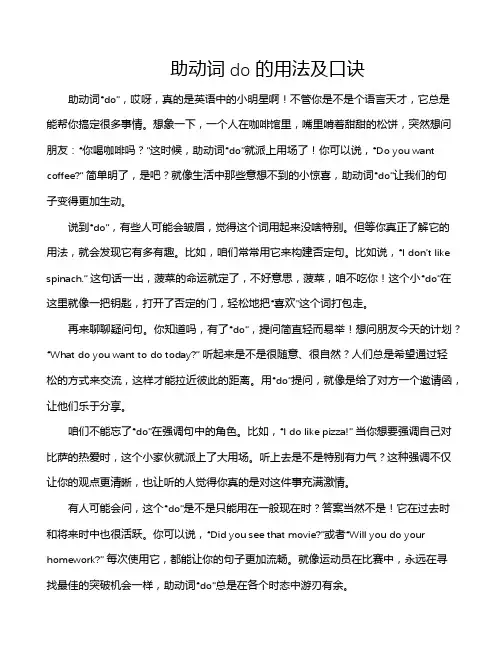
助动词do的用法及口诀助动词“do”,哎呀,真的是英语中的小明星啊!不管你是不是个语言天才,它总是能帮你搞定很多事情。
想象一下,一个人在咖啡馆里,嘴里啃着甜甜的松饼,突然想问朋友:“你喝咖啡吗?”这时候,助动词“do”就派上用场了!你可以说,“Do you want coffee?” 简单明了,是吧?就像生活中那些意想不到的小惊喜,助动词“do”让我们的句子变得更加生动。
说到“do”,有些人可能会皱眉,觉得这个词用起来没啥特别。
但等你真正了解它的用法,就会发现它有多有趣。
比如,咱们常常用它来构建否定句。
比如说,“I don’t like spinach.” 这句话一出,菠菜的命运就定了,不好意思,菠菜,咱不吃你!这个小“do”在这里就像一把钥匙,打开了否定的门,轻松地把“喜欢”这个词打包走。
再来聊聊疑问句。
你知道吗,有了“do”,提问简直轻而易举!想问朋友今天的计划?“What do you want to do today?” 听起来是不是很随意、很自然?人们总是希望通过轻松的方式来交流,这样才能拉近彼此的距离。
用“do”提问,就像是给了对方一个邀请函,让他们乐于分享。
咱们不能忘了“do”在强调句中的角色。
比如,“I do like pizza!” 当你想要强调自己对比萨的热爱时,这个小家伙就派上了大用场。
听上去是不是特别有力气?这种强调不仅让你的观点更清晰,也让听的人觉得你真的是对这件事充满激情。
有人可能会问,这个“do”是不是只能用在一般现在时?答案当然不是!它在过去时和将来时中也很活跃。
你可以说,“Did you see that movie?”或者“Will you do your homework?” 每次使用它,都能让你的句子更加流畅。
就像运动员在比赛中,永远在寻找最佳的突破机会一样,助动词“do”总是在各个时态中游刃有余。
再说说口语,大家都知道,口语中少不了俚语和习惯用语。
比如,想说“你别开玩笑了”,可以用“Don’t be silly!”这里的“do”也可以变身,变成“Do stop joking!” 这样一来,你的表达不仅时尚,还充满了个性。
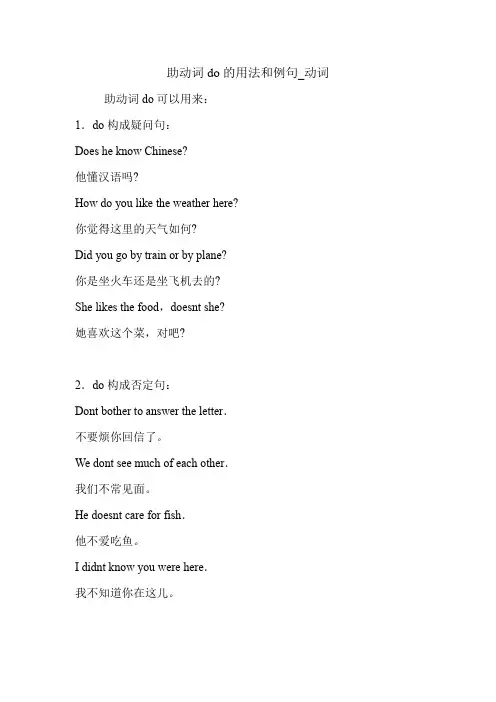
助动词do的用法和例句_动词助动词do可以用来:1.do构成疑问句:Does he know Chinese?他懂汉语吗?How do you like the weather here?你觉得这里的天气如何?Did you go by train or by plane?你是坐火车还是坐飞机去的?She likes the food,doesnt she?她喜欢这个菜,对吧?2.do构成否定句:Dont bother to answer the letter.不要烦你回信了。
We dont see much of each other.我们不常见面。
He doesnt care for fish.他不爱吃鱼。
I didnt know you were here.我不知道你在这儿。
3.表示前面所说动作,以避免重复:Do you work together?Yes.we do.你们在一起工作吗?足的。
(我们在一起工作。
)You dont want to be late.Neither does she.你不想迟到,她也不想迟到。
Youre doing better than you did last term你这学期比上学期表现好。
I said he would fail,and he did.我说他会失败,他真的失败了。
加强语气(起强调作用):I do think youre right.我确实认为你是对的。
She does feel that way.她确实有这种感觉。
She did say that.她确实这样说的。
Do be careful.千万小心。
do在更多情况下用作实意动词,用法很灵活,可表示许多意思,如:Martin has done an excellent article.马丁写了一篇精彩的文章。
He has done a portrait of Lilly.他画了一张丽丽的画像。
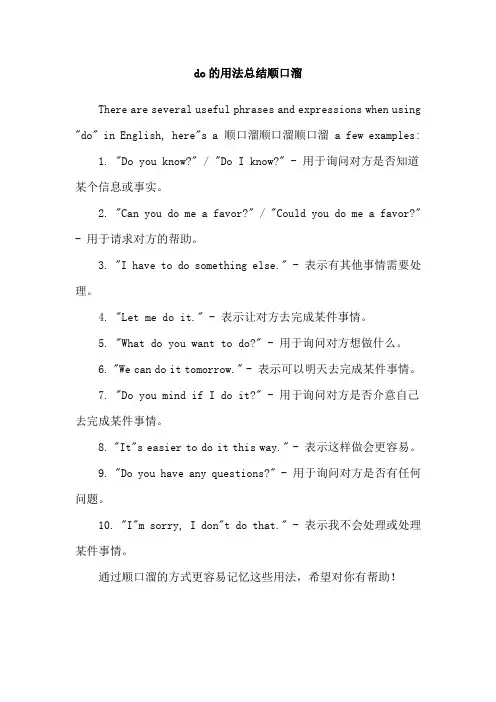
do的用法总结顺口溜There are several useful phrases and expressions when using "do" in English, here"s a 顺口溜顺口溜顺口溜 a few examples: 1. "Do you know?" / "Do I know?" - 用于询问对方是否知道某个信息或事实。
2. "Can you do me a favor?" / "Could you do me a favor?" - 用于请求对方的帮助。
3. "I have to do something else." - 表示有其他事情需要处理。
4. "Let me do it." - 表示让对方去完成某件事情。
5. "What do you want to do?" - 用于询问对方想做什么。
6. "We can do it tomorrow." - 表示可以明天去完成某件事情。
7. "Do you mind if I do it?" - 用于询问对方是否介意自己去完成某件事情。
8. "It"s easier to do it this way." - 表示这样做会更容易。
9. "Do you have any questions?" - 用于询问对方是否有任何问题。
10. "I"m sorry, I don"t do that." - 表示我不会处理或处理某件事情。
通过顺口溜的方式更容易记忆这些用法,希望对你有帮助!。
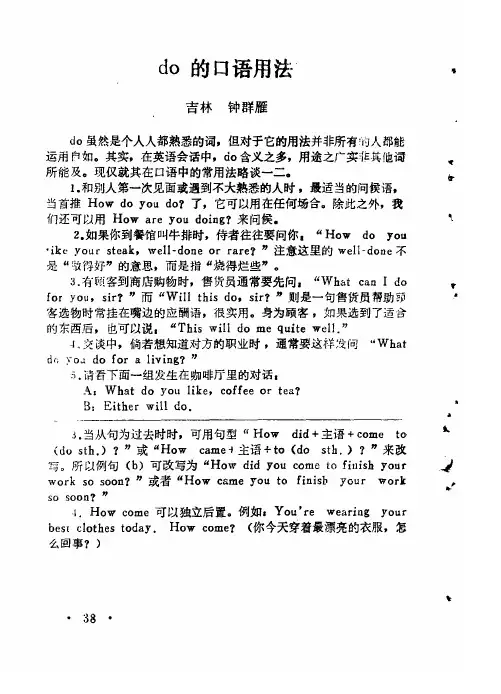
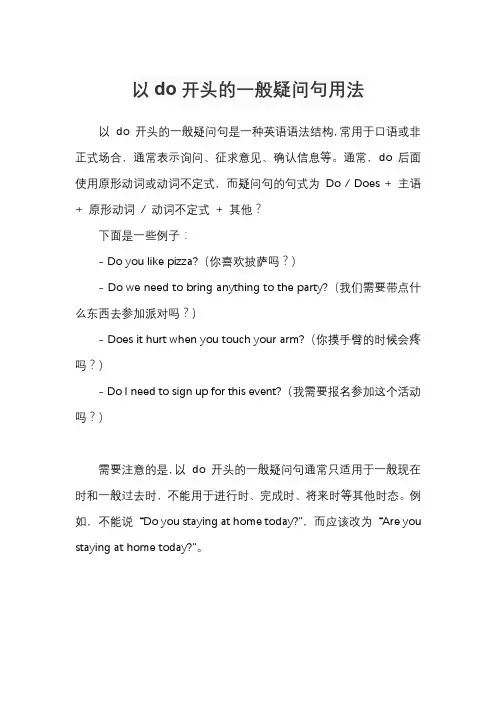
以do开头的一般疑问句用法以do 开头的一般疑问句是一种英语语法结构,常用于口语或非正式场合,通常表示询问、征求意见、确认信息等。
通常,do 后面使用原形动词或动词不定式,而疑问句的句式为Do / Does + 主语+ 原形动词/ 动词不定式+ 其他?
下面是一些例子:
- Do you like pizza?(你喜欢披萨吗?)
- Do we need to bring anything to the party?(我们需要带点什么东西去参加派对吗?)
- Does it hurt when you touch your arm?(你摸手臂的时候会疼吗?)
- Do I need to sign up for this event?(我需要报名参加这个活动吗?)
需要注意的是,以do 开头的一般疑问句通常只适用于一般现在时和一般过去时,不能用于进行时、完成时、将来时等其他时态。
例如,不能说“Do you staying at home today?”,而应该改为“Are you staying at home today?”。
助动词do的用法口诀一、do的基本用法do是英语中常用的助动词之一,它在句子中有多种用法。
首先,do可以作为一个行为动词来使用,表示“做”、“干”等含义。
例如:“What do you do for a living?”(你靠什么谋生?)在这个句子中,do表示“从事”、“从事于”。
二、do的否定形式除了表示行为动词意义外,do还可以帮助构成句子的否定形式。
当我们要表达一个动作是否发生时,可以使用否定形式。
例如:“She does not like chocolate.”(她不喜欢巧克力)这里的does是do的第三人称单数形式。
三、do提问另外一个重要的用法是do可用于疑问句中提问。
在英语中,构成简单疑问句通常需要借助助动词来完成。
例如:“Do you want some tea?”(你想喝点茶吗?)在这个例子中,do被用来引导提问。
四、一般现在时和一般过去时中的have与do搭配除了上述用法外,在一般现在时和一般过去时中,have与do经常搭配使用。
have在这里具有实际的意义,而 do则起到强调的作用。
例如:“I have done my homework.”(我已经完成了我的作业)这里的do用来强调完成的动作。
五、do在强调句中的使用do还可以在强调句中使用。
当我们要强调一个特定的动作或者事物时,可以使用do来加强语气。
例如:“I do want to go to the party tonight!”(我真想参加今晚的派对!)在这个例子中,do被用来强调“真正地想去”。
六、感叹句和虚拟条件句中do的应用当我们表达惊讶或困惑时,也可以使用do来构成感叹句。
例如:“Do you know how much it costs?”(你知道它价值多少吗?)在这个问句中,do帮助表示一种疑问和怀疑。
此外,当我们表达假设、推测或虚拟情况时,也可以用到do。
例如:“If I had more money, I would do more traveling.” (如果我有更多的钱,我会去更多不同的地方旅行) 这里的do表示假设或虚拟条件。
do的用法及短语一、简介使用动词“do”是英语学习的基础之一。
在日常生活中,我们经常会遇到很多与“do”相关的短语和用法。
本文将详细介绍“do”的常见用法及相关短语,帮助您更好地掌握和运用这一常用动词。
二、“Do” 的基本意思动词“do”在英语中是一个非常通用的词汇,有许多不同的含义和用法。
首先,它可以表示进行某些事情或活动,比如做饭(do cooking)、做作业(do homework)等。
此外,在询问或回答关于工作、职业、任务以及活动的问题时,“do”也是一个常见的选择。
例如:- What do you do?(你从事什么工作?)- I'm a teacher.(我是一名教师。
)三、“Do” 的常见用法1. 表示完成任务或工作:使用“do” 可以描述完成一项任务或工作,表达出一个人已经完成了某项具体事情。
例如:- I need to do the laundry.(我需要洗衣服。
)- He does the dishes after dinner.(他晚饭后洗碗。
)2. 表示参加某项活动:当我们想表示参加一项特定活动时,可以使用“do”来描述。
例如:- Are you doing yoga this evening?(你今晚要参加瑜伽课吗?)- We did karate together last week.(我们上周一起练习了空手道。
)3. 表示处理或解决问题:“Do”也可以用来表示处理或解决问题的过程。
例如:- I need to do some math problems.(我需要做一些数学题。
)- They are doing their best to solve the issue.(他们正在尽力解决这个问题。
)4. 表示模拟或扮演角色:在戏剧、电影等场景中,“do”可以表示扮演某个角色或适应特定角色的动作。
例如:- She is doing the role of Juliet in the play.(她在话剧中扮演朱丽叶的角色。
托福口语常见动词do和get实用用法托福口语常见动词相关词组搭配拓展分享do/get实用用法汇总,今天给大家带来了托福口语do/get实用用法汇总,希望能够帮助到大家在托福口语中拿高分,下面就和大家分享,来欣赏一下吧。
托福口语常见动词相关词组搭配拓展分享do/get实用用法汇总托福口语常用动词词组:do相关词组be done in 精疲力竭be done with 完全结束do a good deed 做一件好事do away with 去掉,废除;弄死;浪费do good to (=do sb. good) 有益于do harm to (=do sb. good) 有害于do its work 有效,有作用do much 极有用do wrong to 做错do one’s best 尽某人最大努力do one’s homework 做作业do one’s utmost 尽力而为do proud 足以使~~骄傲do sb. justice 公平对待某人do some cleaning (V+ing,etc.) 搞卫生do sb. a favor 帮助某人do well in 学得不错,干得漂亮do with 和~~相处,忍受,处理do without 不需要,不用do wonders 创造奇迹have much to do with 和~~很有关系have nothing to do with 与~~无关have something to do with 和~~有关in doing so=in so doing 这时,在这种情况下That will do. 行了;够了托福口语常用动词词组:get相关词组get about 徘徊,走动,旅行;流传get above oneself 自视高傲get accustomed to 习惯于,对~~习以为常get across 度过,通过,横过;说服,使理解get ahead of 胜过,超过get along 前进,进步;同意;离去get along with 与~~相处get at 发现,了解;掌握;攻击have got to do 不得不,必须get away 离开,逃脱get back 取回,回来;报复get behind 落后;识破get down 咽下;写下;使沮丧,使抑郁get down to 认真对待,静下心来get familiar with 熟悉get hold of 获得,取得get home 到家get in 进入,陷入;牵涉get off 送走;脱下(衣服);下车;动身get on 上车;穿上;进步,使前进;成功;相处get upon with 进步;在~~方面获得成功get one’s hand in 熟悉;习惯get out of 由~~出来,从~~得出;避免;退休get over 越过;恢复,痊愈;克服;完成get ready for 为~~作准备get rid of 除去,去掉;免除,摆脱get through 到达,完成,通过;及格get together 积聚,积累;商谈,取得一致意见get up 起床,起立;研究,钻研;致力于;安排,组织get used to 习惯于托福口语考前练习题目5月26日考情回顾:Task 1: Your friend wants to attend a summer school to graduate one year earlier from the university. Talk about an advantage and /or a disadvantage of doing this. (命中,机经Task 2第17题)Task 2: Your university is planning to allow people in the community to take courses with students. This course will be free for them and they will not receive feedback or grades about their papers. Do you think this is a good program and why?Task 11. What is the most important habit that parents can teach their children?2. Among the three, who do you think can tell the kids right from wrong?FamilyTeachersFriends3. What are the advantages and disadvantages of eating fast food?4. Describe a change in your school that was initially considered by students as having negative effects on their life but later proved to be positive?5. Your friend is coming to take a visit to your country. Which transportation would you like to recommend to him? Include explanations in your response.6. Which of the following areas of current events do you most like to read?PoliticsSportsArts and films7. University students encounter many difficult challenges in their studies. Which challenge do you think is the most difficult one and how do you deal with it?8. What are the advantages and disadvantages of expelling students from their school, if they are caught cheating in exams?9. The school allows students to keep pets in their dorms. Do you think it is good or not?10. If you have opportunities to do something for good causes, which of the following would you choose?distributing meals for needy peoplehelping children build playgroundseeing people in hospital11. Your friend is coming to your country for studying, but he or she is worried about the cost. What are the suggestions you can offer?12. Which of the following period of life do you think is the hardest? Childhood, teenager, adulthood?13. There are several ways you can get to know a country without travelling abroad. Which of the following ways would you like to choose?Reading booksWatching videosJoining online communication groupsChoose one and explain why.14. Which of the following three would you choose to do in summer vacation? Working as a librarian, painter in an art center, or life guard in the natatorium?15. Talk about the advantage and disadvantage of universities located in small town or rural areas.16. Is it important to be polite and have good manners?17. Your community center now offers classes on the weekends for free. Which of the following classes will you choose to take?financial course to help you manage money;car maintenance and repair;review of Latin-American music.18. If universities are given financial support to develop researches, which one do you think would receive more benefits.To predict weather more accurately.To clean rivers and ocean.To deal with outer space.19. Recall an argument that you have ever had with others and describe the details of the conflict.20. What kind of strategy do you use to handle an overwhelming amount of work?1. Some people like to take less informative but interesting lectures. Others like to take boring but more content rich lectures. Which do you prefer?2. Some people believe that students should participate after school activities while they are dealing with their school work. Others prefer to focus on school work only. Which do you prefer?3. Some people like to make decisions based on their own experience;while other people prefer to ask others for help such as family and friends. Which do you prefer and why?4. Some managers tend to check workers task closely or frequently; while others tend to check them rarely or causally. Which is better for the management?5. When giving feedbacks to students, some teachers would like to talk to their students in person; while some teachers would give written comments to students. Which do you prefer and why?6. Female and male university students should have separate residence halls. Do you agree or disagree?7. Do you agree or disagree with the statement that its easier to teach elementary school kids than college students?8. Do you agree or disagree with the statement that people should dress following fashion trends?9. Do you agree or disagree that its acceptable for students to disagree with their instructors?10. Some people speak out in class. Others prefer to listen and quietly observe. Which do you think leads to greater success in school? Why?11. Some teachers let students choose topics that interest them on research papers. Others assign topics on research papers. Which one do you prefer?12. Some people believe old people should not take risk and participate adventurous events as the young people. Do you agree? Why?13. Do you agree or disagree with the following statement? Good teachers admit they make mistakes or dont know something.14. Some people prefer to give their opinions immediately. Others prefer to wait and listen to others opinions before giving their own. Which one do you think is better?15. Friends may disagree with each other, and still maintain friendship. Do you agree with or disagree with this idea, why?16. Do you agree or disagree that one of the best ways to learn about a country is to watch its TV shows?17. Do you agree or disagree with the following statement:For the success of business, it is important to be friendly and outgoing?18. Do you agree or disagree with the following statement, the most important element of a successful school is experienced teachers?19. Some people prefer to do take a vacation in cities, and others prefer to spend their vacation in countryside. Which do you prefer? Explain why.20. Do you think it is reasonable to give a lower grade to the assignment that hand in after deadline?托福口语考前练习题6月10日考情回顾:Task 1: Your school decides to use electronic newspapers instead of paperones. Talk about the advantage and disadvantage of this decision.Task 2: Some teachers prefer to answer students’ questions while they aredelivering a lecture. Some teachers prefer to answer their questions when thelecture is over. Which one do you prefer? Why?TASK 11. What activity do you think can cultivate childrens sense ofresponsibility?2. Which one of the following do you think is the most important qualityfor an entrepreneur?outgoingclear-mindedinnovative。
英语口语:掌握do的10种用法,你会发现原来学英语这么简单!要说英文里使用的高频词do绝对是要上榜单的在字典里查do它的解释有不下20种特别是在口语中它的用法十分广泛而且常常是出现在不同的地方就会有不同的解释do lunch/movie 吃午饭/看电影Lets do lunch next week.我们下周一起去吃午饭吧。
打招呼可用:-How do you do? 你好-How do you do? 你好-How are you doing? (How you doing?)你还好吗?-Im doing alright. 我还行。
What can I do for you?需要帮你做点什么吗?No can do. 我做不到啊。
No can do I got plans later.哈哈哈哈办不到,我日程很满的嘻嘻。
收拾打扮:do oneself upShe spent ages doing herself up.有的女孩花很多年整容。
表示发型Hey check out my new do!快看我的新发型!表示整理,装饰,修缮:do sth. out/ do sth.up 相当于decorateThe room was beautifully done out in blue color.这个房间用蓝色系的装饰弄的非常漂亮。
The apartment was done up in modern style.这个公寓是现代风格装修的。
揍某人一顿, 或者甚至是杀了某某:do sb. in. 相当于beat someone upMy friend and me will do you in if I see you stealing from my shop again.如果你再从我店里偷东西,我和我的朋友会狠狠揍你一顿。
批评某人,尤其指以不公平的方式:do sb. downI know you dont like him, but theres no need to keep doing him down in front of his girlfriend.我知道你不喜欢他,但是也没必要当着人女朋友面批评他啊。
疑问句中do和does的用法一、do和does的基本用法疑问句中,“do”和“does”是两个常用的助动词,用于构成一种特殊的句型,即疑问句。
在英语中,“do”和“does”分别表示行为,它们在不同的人称和时态下有着不同的形式。
具体来说,我们可以简单地总结为:1. 在一般现在时(Simple Present Tense)中,对于第三人称单数(He/She/It),我们使用“does”,而对于其他人称以及复数形式,则使用“do”。
例句:- Does he like coffee?- Do you play basketball?- Do they study English?2. 在一般过去时(Simple Past Tense)和一般未来时(Simple Future Tense)中,无论什么人称都要使用“do”。
这也是它们与一般现在时的主要区别。
例句:- Did he go to the party?- Do you think it will rain tomorrow?二、疑问句中do和does的含义差异尽管“do”和“does”的形式上有所差异,但它们在疑问句中所表达的含义其实是相同的。
它们都用于询问对方是否从事某种活动或者对某件事情持有何种看法。
当我们用这两个助动词引导疑问句时,常常需要根据具体语境来决定是选择“do”还是“does”,以便与特定的主语形式相匹配。
所以说,“do”和“does”的用法实际上只是根据句子的主语而产生的变化。
三、其他用途除了疑问句,助动词“do”和“does”还有一些其他的用法。
1. 强调句:在某些情况下,我们可以使用助动词“do”或“does”来强调谓语动词。
这种结构在口语中比较常见。
例句:- I do like pizza.- He does have a car.2. 否定句:要构成一般现在时或一般过去时的否定句,我们需要在助动词不变的情况下,在其后加上“not”。
be动词do的用法口诀一、be动词do的用法概述在英语中,be动词是一个非常常用且重要的动词。
它有多种形式,如am、is、are、was、were等,用来表示人或事物的状态、性质、特征等。
而其中的一个特殊形式——be动词do,在口语和书面语中也有着广泛的应用。
本文将从不同角度介绍be动词do的使用方法与口诀。
二、be动词do在陈述句中的使用1. 表示主语身份:在陈述句中,be动词do可以直接用于第一人称单数(I)、第三人称单数(he/she/it)以及复数形式(we/you/they)作为简单谓语来表达主语身份和存在状态。
例如:- I am a student.(我是一个学生。
)- She is my sister.(她是我的妹妹。
)- They are good friends.(他们是好朋友。
)2. 表示陈述事实:be动词do也可以加在其他动词前面,表示对某项行为或活动的肯定性或否定性陈述。
例如:- He does his homework every day.(他每天做作业。
)- They don't like spicy food.(他们不喜欢辣食。
)3. 表示变化或持续状态:be动词do还可以用于表达某种变化或持续的状态。
例如:- The weather is getting colder.(天气越来越冷了。
)- She has been working in this company for five years.(她在这家公司已经工作了五年。
)三、be动词do在疑问句中的使用1. 一般疑问句:将be动词do提至句首,使其成为疑问句的助动词。
例如:- Do you like ice cream?(你喜欢冰淇淋吗?)- Is she your teacher?(她是你的老师吗?)2. 特殊疑问句:be动词do也可以用于特殊疑问句中,通过提问特定的事物或情况来获取相关信息。
例如:- Where do you live?(你住在哪儿?)- How often does he go to the gym?(他多久去一次健身房?)四、be动词do在否定句中的使用1. 否定陈述句:将be动词do与not连用构成否定形式。
do的口语用法归纳
do sb sth结构用法归纳
一、do sb a favour的用法
该结构表示“帮助某人”,也可说成do a favour for sb,注意其中有不定冠词。如:Would
you do me a favour please? 请你帮我个忙,好吗?t; mso-char-indent-count: 2.0">He is
always ready to do a favour for his classmates. 他总是乐于帮助同学。以下各句均可表示“劳
驾请把窗户打开”。注意,当 favour 后有定语修饰时,其前习惯上要用定冠词: Do me a
favour and open the window. Do me a favour by opening the window. Do me a favour—open
the window, please. Do me the favour to open the window. Do me the favour of opening the
window.
二、do sb good的用法
该结构表示“对某人有益或有好处”,其中的 good 为不可数名词。如: Exercise will do
you good. 运动对你会有好处。Eat more fruit—it will do you good. 多吃水果,这对你有好
处。A week’s vacation will do you a lot of good. Go on with the treatment. It is doing you
good. 你要继续进行这种疗法。它对你是有效的。
三、do sb harm 的用法
该结构表示“对某人有害”,其中的 harm 为不可数名词。如:Smoking does harm to
your health. 吸烟对你的身体有害。A few late nights never did anyone any harm. 熬几个晚
上的夜对人绝无害处。Whether it will do us harm remains to be seen. 是否对我们有害还要
看一看。Whether it will注:也可说成 do harm to sb。如:Such books do great harm to young
people.=Such books do young people great harm. 那样的书对年青人危害很大。
四、do sb honour 的用法
该结构也可说成do honour to sb,它有以下两个方面的意思:1. 对某人表示敬意或纪
念。如:They did honour to the dead. 他们向死者致敬。2. 给某人带来荣誉或使某人受到
尊敬。如: His contributions to science do honour to our country. 他在科学上的贡献为祖
国增了光。We attended his birthday party to do him honour. /We attended his birthday
party to do honour to him. 我们参加了他的生日晚会以表示对他的敬意。注意:do sb the
honour of doing [to do] sth 的意思是do sb the honour of doing [to do] sth “给某人面子做某
事”“给某人做某事的荣幸”。如:Would you do me the honour of dancing with me?=Would
you do me the honour to dance with me? 能请你跳曲舞吗?
五、do sb a kindness的用法
该结构表示“好心地为某人做某事”“帮某人的忙”,其中的 kindness 为可数名词。如:
Will you do me a kindness? 你愿帮我个忙吗?He has done me many kindness. 他帮了我不
少忙。
六、do sb a service的用法
该结构表示“帮某人的忙”,注意其中有不定冠词。如:Will you do me a service? 帮我
个忙好吗? You did me a great service by telling me the truth. 你把实情告诉我,这对我很有
好处。
七、do sb wrong的用法该结构表示“冤枉某人”“冤屈某人”,wrong 前通常不用冠词,
但若有形容词修饰,也可用不定冠词修饰。如:You did me wrong. 你冤枉我了。You did me
wrong. He did her a terrible wrong. 他真的是太冤屈她了